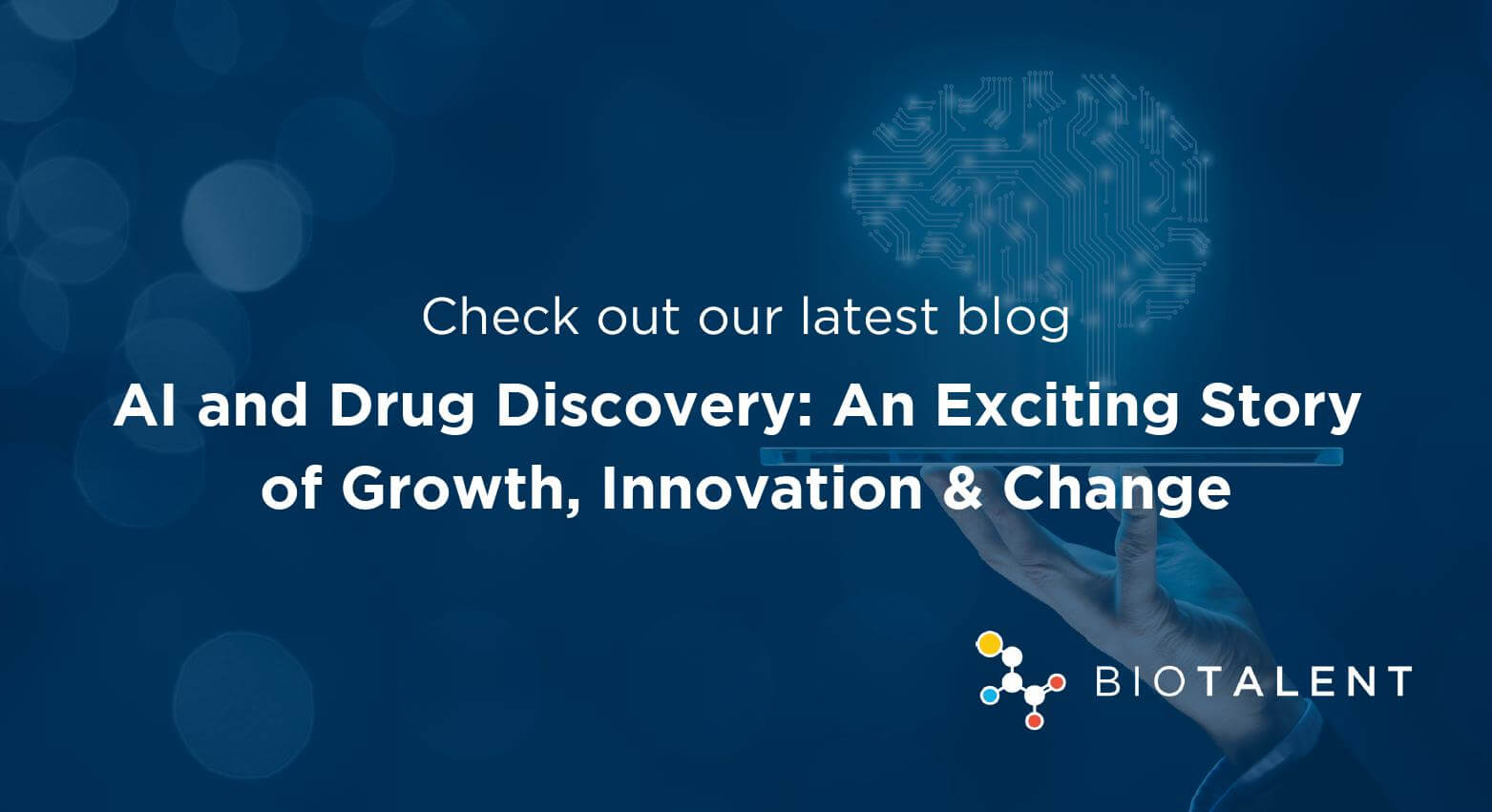As an AI recruitment specialist, I am passionate about the positives of AI to aid effective pharmacological solutions across the field of human need – from diagnosing disease, therapeutic interventions and the subject of this blog, drug discovery.
I want to start with two simple questions:
Is AI taking over drug discovery in the pharma industry?
Emphatically no.
Is AI having a profound effect on the way research is conducted, the speed of delivery and the pharma business model?
Emphatically yes.
I am an AI recruitment specialist inside BioTalent, a niche life sciences recruitment agency dedicated to supporting cutting-edge scientific research globally with the right cutting-edge skillsets. I have specialised in this sector for four years now and have seen an explosion in investment and rollout implementation of AI innovation across the pharma sector, paralleled by an equal surge in demand for talent globally.
I would question, however, the way AI can be trotted out as a buzzword, particularly by the mainstream, non-specialist media, and presented as the panacea for research solutions.
What is AI?
I would describe AI as a ‘tool’ – as far-reaching in its potential and as innovative for pharmaceuticals as Arkwright’s Spinning Jenny was for the UK’s textile industry at the start of the industrial revolution. AI enhances drug discovery – it will not replace pharma processes. It is a way to access and analyse analyze data fast, so we learn more and better about our own biology, working through data to build clever solutions.
Dr Krishnan Nandabalan, President and CEO, Inveniai and co-founder Bioxcel Corporation has described it as“a force multiplier”– a method by which “to comprehensively analyze all the data that's available to you, whether it's clinical data, whether it's scientific data, whether it's patient-recorded data, whether it's data from hospitals, managed care, and all of these have an impact on the drug discovery and development process”.
The significance of AI in drug discovery
Back in 2004, when AI was still in its infancy, it wasestimated it took 12.5 yearsfor a technically successful drug to be approved and launched, at a conservative costing of more than $1 billion.
Today, costs continue to be high: Airfinity, for example, has identified Covid-19 vaccine development costs for AstraZeneca at £8.19billion; PfizerBioNTech £2.25billion; Moderna £1.9billion.
But new speeds of delivery - from identifying potential to vaccine approval and rollout - have been phenomenal. As Juan Alvarez, an associate vice president for computational chemistry at Merck & Co observed, pre-pandemic, machine-learning methods“are going to be critical”to drug discovery.
So just how is AI helping drug discovery?
1. Repurposing existing drugs and drug combinations quickly (particularly significant for the effective management of severe Covid-19 infection, for example)
2. Developing new drugs (Covid-19 vaccines, for example)
A recent research paper- Artificial Intelligence for COVID-19 Drug Discovery and Vaccine Development – identified that machine-learning (ML) has offered compound property prediction, activity prediction, reaction prediction and ligand-protein interaction.
“If enough data are presented to a model, it can aid the search for a drug or vaccine candidate by identifying patterns within the data,”say the researchers.
The fact that global tech companies such as Facebook and Google (whose DeepMind 2018 protein folding breakthrough astonished the bioscience community) have embraced AI life science research and the use of Big Data has accelerated recent AI growth and investment.
How are pharma companies developing AI capacity to best support drug discovery?
Developing new teams
Widening the talent pool
Embracing new thinking
Redesigning traditional structures to challenge established mindsets and cultures
Partnering with specialist AI biotech organizations
In short, we are seeing innovation on an unprecedented scale, in which global consultancy companies such as Ernst & Young and PwC, for example, are now providing thought-leadership and methodology to aid the traditional pharma market to adapt quickly.
What are the skills required for AI roles in drug discovery?
I speak to candidates regularly when recruiting for AI specialist roles. As a new field, AI in drug discovery requires flexibility of talent and knowledge including:
Technology understanding
Data science expertise
Deep Learning, Machine Learning, AI
Agile & Flexible Processes
Drug discovery of Large & Small Molecules
Deep Regulatory Understanding
Programming Skills
Communication Skills
Potential roles inside teams working across disciplines in this expanding field include Bioinformatics, Computational Chemistry & Biology, AI & Machine Learning Scientists and Data Scientists
Where will AI take us in the future?
The global prediction: we are only in the foothills of AI’s potential to support drug discovery and other life sciences research. I share this prediction and am excited to be part of this journey, committed with a passion for the potential of AI and to supporting clients and candidates move forward successfully in this field.
Science is all about asking questions. I opened with two; I leave you with two more.
What do you think about the potential of AI?
Where do you think AI in pharma will be this time next year, the next five years, the next decade?
Luchele Mendes is a subject matter expert within AI in Life Sciences with a strong track record of advising and supporting clients through all manner of AI & Data Science requirements. She has an extensive network of global talent to call on and has built an exceptional reputation in her field. She would be delighted to discuss Data Science & AI requirements with clients and support talent to develop their careers across this vast and growing field. Please contact her for a conversation at luchele.mendes@biotalent.com or find some exciting AI opportunities here.
BioTalent is part of Trinnovo Group; we aim to build diversity, create inclusion and encourage workplace innovation.
